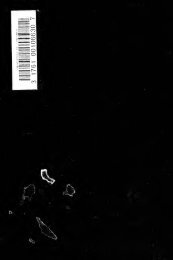Chau Ju-Kua - University of Oregon Libraries
Chau Ju-Kua - University of Oregon Libraries
Chau Ju-Kua - University of Oregon Libraries
Create successful ePaper yourself
Turn your PDF publications into a flip-book with our unique Google optimized e-Paper software.
Ij22 TUB ARABS. 121<br />
8) Confer what our author says here <strong>of</strong> the Nile with his other account <strong>of</strong> it in Ch XXX.<br />
Ch6u K'tt-fei did not know <strong>of</strong> the Nile; our author, so far as we are aware, is the earliest<br />
Chinese author to refer to it.<br />
9) This may he a reference to Kolzum on the Ked Sea, the Clysma <strong>of</strong> late classical writers,<br />
5 and to the canal re-opened by Amru somewhere about A. D. 642 between the Nile and the Eed Sea,<br />
and which appears to have followed very closely the line <strong>of</strong> the Fresh-water Canal <strong>of</strong> the present<br />
day. After its re-oponing by Amru it remained navigable for eighty years, when, choked with sand,<br />
it was again abandoned. Muir, Annals <strong>of</strong> the early Caliphate, 244. Another possible and more<br />
probable explanation is that it refers to OboUah and Basra, a district famous for its canals, which,<br />
10 accordiug'to Ib'n Haukal, exceeded 100,000 in number, and <strong>of</strong> these 20,000 were navigable for<br />
boats. Le Strange, Land <strong>of</strong> the Eastern Caliphate, 46.<br />
10) The list <strong>of</strong> products here given includes the most important ones brought to China by<br />
the Arabs from various countries <strong>of</strong> the West; more detailed descriptions <strong>of</strong> them arc given in<br />
Part II this work.<br />
15 , 11) The last character is certainly an error, it should be ^a(ii&). In another passage (Pt. II,<br />
Ch. XXXVI) our author, however, writes the name Ma-Io-mo (^^ R|^ -f^)- ^^ shown in a pre-<br />
vious note (supra, p. 25 note 3-) the country referred to is Mirbat (Lb^) on the Hadramaut<br />
coast <strong>of</strong> Arabia. Ch6u K'fl-fei says <strong>of</strong> it (3,2, continuing the passage quoted supra, pp. 119—120):<br />
«The king <strong>of</strong> the country, the <strong>of</strong>ficers and the people all worship Heaven (i. e. are iloslims). The<br />
20 gentry wear turbans <strong>of</strong> white silk falling down the back; they have designs in gold thread in them;<br />
Their clothes are. made <strong>of</strong> white yui-no stuff with golden characters in it, or else <strong>of</strong> brocades (f<br />
sundry kinds. They wear red leather boots. They live in five-storied houses. They eat wheaten<br />
cakes, meat and milk. The poor eat fish and vegetables. The soil does not produce rice. The fruits<br />
they produce are more sweet than sour. They make wine from grapes. There is also the drink<br />
25 (called) ssi (}^^ ^^ V®) ''^hich is a decoction <strong>of</strong> sugar and spices. Mixing honey and spices<br />
they make drinks (called) me?, ss'i-la, hua ( j^ ^^ :J*J' 3pE), which are heating and stimulating.<br />
Their coins are <strong>of</strong> toth gold and silver. (It is a place) where big ships and wealthy traders con-<br />
gregate ( g<br />
^ *M ^ "^1^ ^ )•<br />
^"^ *'"'' *^''''^ y^'"' J/"«w-2/'« <strong>of</strong> Ch&-tsuug (1088 A. D.) in<br />
the eleventh moon, people sent by the Ta-shi <strong>of</strong> Ma-lo^pa presented tribute to our Court. Now this<br />
30 Ma-lo-pa is the same as Ma-li-pa» ^'''"^s''*'i {^ ^^ makes sundry mentions' <strong>of</strong> «the<br />
-l'^)'<br />
country <strong>of</strong> Ma-lo-pa <strong>of</strong> the Ta-shi». It records (17,s) the coming <strong>of</strong> the mission <strong>of</strong> 1088, spoken <strong>of</strong><br />
by Ch6u K'u-fei, and also (17,i3) that <strong>of</strong> missions from the same country in 1089 and in 1094.<br />
12) Shi'-ho is Shehr, another port on the Hadramaut coast, <strong>of</strong> considerable importance in<br />
mediaeval times; it is the Esher (or Soer) <strong>of</strong> Marco Polo, sec Yule's, Marco Polo (2^ edit.), II,<br />
'35 324, 439 and Heyd, Hist, du Commerce, II, SOO. See also infra, Pt. II, Ch. XXV.<br />
Nu-fa is Zufar, the modern Dh<strong>of</strong>ar f^UJi), the Dufar <strong>of</strong> Polo, about 400 miles E^<strong>of</strong> Shehr.<br />
Yule, op. oH., II. 441-442, Hey d, op. cit., II, 015. Ming-shi, 326, calls it Tsu-fa-ir (|g^ ^ ^).<br />
• " Ya-ssi-piin-hito, in Amoy dialect A-su-pau-han, is Ispahan or Isfahan. In the Yuan<br />
period we find the name written I-ssi-fa-hang (:^ ,g, ^ i^). Cretschneider, J. C. B'.<br />
40 A. S., X, See also infra, Pt. II, Ch. IX.<br />
Lo shJ-mei in Cantonese Lo-shi-mi, appears to be a tiimcated transcription <strong>of</strong> Khwaiizm,<br />
the country south <strong>of</strong> the sea <strong>of</strong> Aral; Lo-shi-mei probably representing the sound rizm. See alsd<br />
infra, Pt. II, Ch. IX. It is called Ho-li-si-mi-kia (^ ^|] ^ ^ jjp ) by H U a n-t s a ng (J u 1 i e n,<br />
HI, 283), andis probably first referred to (Ts'ien Han-shu, 96A, 176) as one <strong>of</strong> the dependencies <strong>of</strong><br />
45 K'ang-k'u (Sogdiana) under the name <strong>of</strong> Au-kien (^ ^), the old sound <strong>of</strong> which characters,<br />
according -to Yen Shi-ku, was Dk-ken, which may be connected with the name <strong>of</strong> the present city<br />
<strong>of</strong> Kuhne, (Old) Urgendj, the GorgSniya <strong>of</strong> the Middle Ages. In the commentary on this passage (see<br />
Han-shu Si-yQ-chuan-pu-chu, l,si) Au-kien is identified with Huan-tsa^'s Ho-li-si-mi-kia,andthe<br />
abbreviated names (appearing in T'ang-shu, 22 1 B,5)<strong>of</strong> Huo-siin (^ ^) andKuo-li()j^ ^|J),<br />
50 which the T'ang-shu says correspond with the site <strong>of</strong> the ancient city <strong>of</strong> Au-kien The description<br />
<strong>of</strong> the T'ang-shu leaves but little doubt about the identification <strong>of</strong> all these names with<br />
Khwarizm.

















